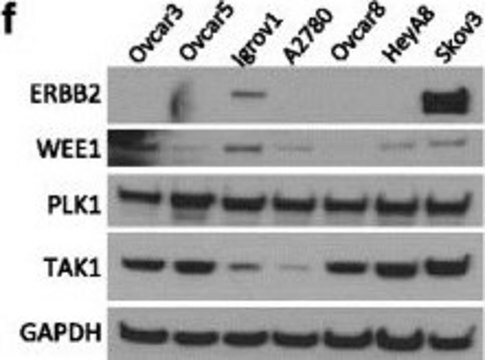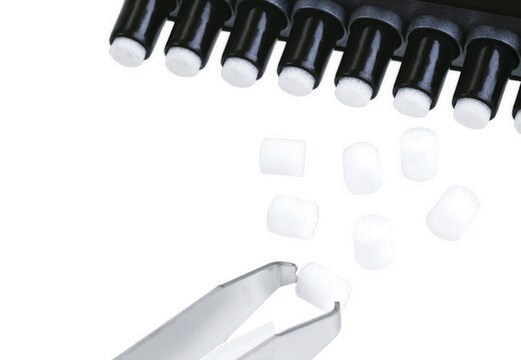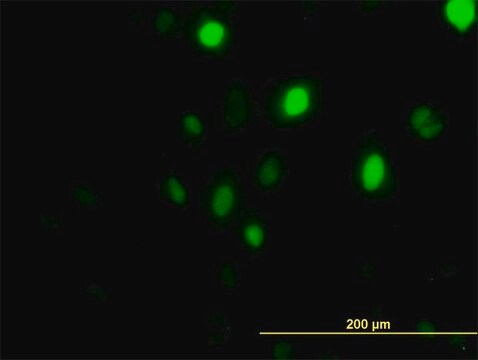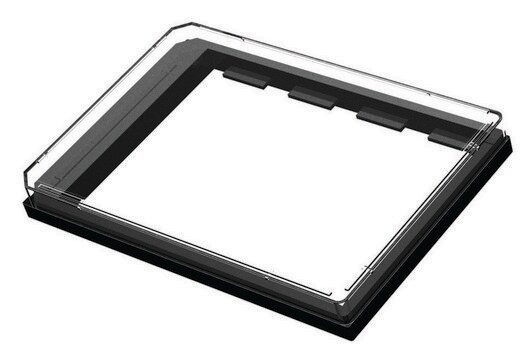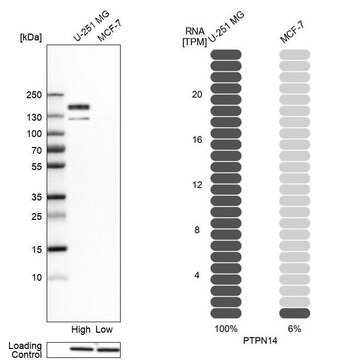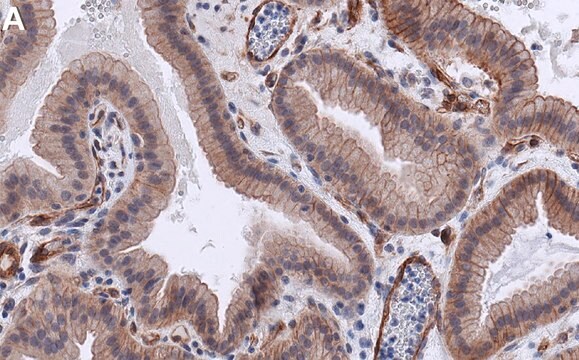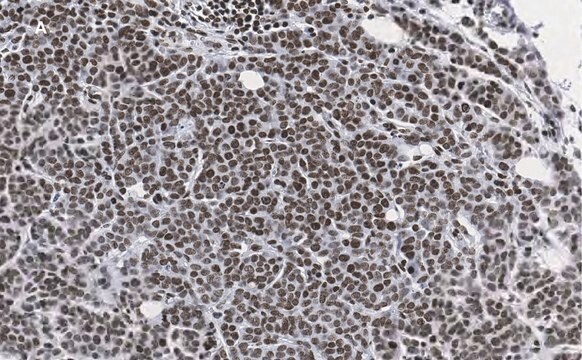General description
We are committed to bringing you greener alternative products, which adhere to one or more of The 12 Principles of Green Chemistry.This antibody is Preservative-free, produced without the harm or sacrifice of animals and exceptionally stable to allow for ambient shipping and storage if needed and thus aligns with "Waste Prevention", "Designing Safer Chemicals" and "Design for Energy Efficiency".
Click here for more information.
ZooMAb® antibodies represent an entirely new generation of recombinant monoclonal antibodies. Each ZooMAb® antibody is manufactured using our proprietary recombinant expression system, purified to homogeneity, and precisely dispensed to produce robust and highly reproducible lot-to-lot consistency. Only top-performing clones are released for use by researchers. Each antibody is validated for high specificity and affinity across multiple applications, including its most commonly used application. ZooMAb® antibodies are reliably available and ready to ship when you need them.
Specificity
Clone 1F2 is a ZooMAb® rabbit recombinant monoclonal antibody that specifically detects Polo-like Kinase 1 (PLK1). It targets an epitope within 22 amino acids from the C-terminal half.
Immunogen
KLH-conjugated linear peptide corresponding to 22 amino acids from the C-terminal half of human Polo-like Kinase 1 (PLK1).
Application
Quality Control Testing
Evaluated by Western Blotting in HEK293 cell lysate.
Western Blotting Analysis: A 1:1,000 dilution of this antibody detected PLK1 in HEK293 cell lysate.
Tested Applications
Western Blotting Analysis: A 1:10,000 dilution from a representative lot detected PLK1 in lysate from PC12 cells and His-tagged, full-length recombinant Human PLK1; and 1:1,000 dilution detected PLK1 in lysates from NIH3T3, and HeLa cells.
Affinity Binding Assay: A representative lot of this antibody bound His-tagged, full-length, recombinant Human PLK1 with a KD of 7.0 x 10-9 in an affinity binding assay.
Enzyme Immunoassay (ELISA) Analysis: A serial of dilutions from a representative lot detected His-tagged, full-length recombinant Human PLK1.
Note: Actual optimal working dilutions must be determined by end user as specimens, and experimental conditions may vary with the end user.
Target description
Serine/threonine-protein kinase PLK1 (UniProt: P53350; also known as EC: 2.7.11.21, Polo-like kinase 1, PLK-1, Serine/threonine-protein kinase 13, STPK13) is encoded by the PLK1 (also known as PLK) gene (Gene ID: 5347) in human. PLK-1 is a serine/threonine-protein kinase that performs several important functions throughout M phase of the cell cycle, including the regulation of centrosome maturation and spindle assembly, the removal of cohesins from chromosome arms, the inactivation of anaphase-promoting complex/cyclosome (APC/C) inhibitors, and the regulation of mitotic exit and cytokinesis. Its expression is observed in placenta and colon and its activity is enhanced by growth promoting agents. PLK-1 is activated by phosphorylation at Thr210 by Aurora™ kinase A. It accumulates to a maximum during the G2 and M phases and declines to a nearly undetectable levels following mitosis and throughout G1 phase. However, it begins to accumulate again during the S phase of cell cycle. The kinase domain of PLK-1 is localized to amino acids 53-305 with activation loop in the region of amino acids 194-221. PLK-1 contains 2 POLO box domains (aa 417-480 and 515-584), which ACT® as phosphopeptide-binding module that recognize and bind serine-phosphothreonine/ phosphoserine]-(Proline®/X) motifs. PLK-1 recognizes and binds docking proteins that are already phosphorylated on these motifs, and then phosphorylates them. Defects in PLK1 gene are associated with some cancers, such as gastric, thyroid or B-cell lymphomas. Expression is shown to be higher in tumor tissues with a poor prognosis, suggesting its role in malignant transformations and carcinogenesis. This ZooMAb® recombinant monoclonal antibody, generated by our propriety technology, offers significantly enhanced specificity, Affinity™, reproducibility, and stability over conventional monoclonals. (Ref.: Kalous, J., and Aleshkina, D. (2023). Cells. 12(1); 187; Liu, Z., et al. (2017). Trans. Oncol. 10(1); 22-32; Jang, Y-J., et al. (2002). J. Biol. Chem. 277(46); 44115-44120).
Physical form
Purified recombinant rabbit monoclonal antibody IgG, lyophilized in PBS, 5% Trehalose, normal appearance a coarse or translucent resin. The PBS/trehalose components in the ZooMAb formulation can have the appearance of a semi-solid (bead like gel) after lyophilization. This is a normal phenomenon. Please follow the recommended reconstitution procedure in the data sheet to dissolve the semi-solid, bead-like, gel-appearing material. The resulting antibody solution is completely stable and functional as proven by full functional testing. Contains no biocide or preservatives, such as azide, or any animal by-products. Larger pack sizes provided as multiples of 25 µL.
Reconstitution
300 µg/mL after reconstitution at 25 µL per vial. Please refer to guidance on suggested starting dilutions and/or titers per application and sample type.
Storage and Stability
Recommend storage of lyophilized product at 2-8°C; Before reconstitution, micro-centrifuge vials briefly to spin down material to bottom of the vial; Reconstitute each vial by adding 25 µL of filtered lab grade water or PBS; Reconstituted antibodies can be stored at 2-8°C, or -20°C for long term storage. Avoid repeated freeze-thaws.
Other Notes
Concentration: Please refer to the Certificate of Analysis for the lot-specific concentration.
Legal Information
ACT is a registered trademark of Merck KGaA, Darmstadt, Germany
Affinity is a trademark of Mine Safety Appliances Co.
Aurora is a trademark of Avanti Polar Lipids, LLC
Proline is a registered trademark of Sartorius Biohit Liquid Handling Oy
ZooMAb is a registered trademark of Merck KGaA, Darmstadt, Germany
Disclaimer
Unless otherwise stated in our catalog or other company documentation accompanying the product(s), our products are intended for research use only and are not to be used for any other purpose, which includes but is not limited to, unauthorized commercial uses, in vitro diagnostic uses, ex vivo or in vivo therapeutic uses or any type of consumption or application to humans or animals.

